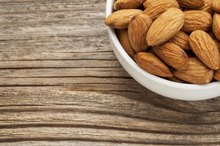Can Coconut Oil Clog Arteries?
Saturated fat can raise harmful cholesterol levels that may eventually clog the arteries. Animal protein foods, such as meat and dairy, contain these fats, but plant foods, including coconut and coconut oil, can also contain saturated fats. Reducing your intake of saturated fat helps maintain healthy cholesterol levels to decrease your risk of heart disease. Although many people may think animal protein foods have more fat than plant foods, the high amounts of saturated fat in coconut oil still make it worth considering when seeking to reduce your fat intake.
Fat Buildup
Too much low-density lipoprotein, or LDL, cholesterol forms plaques on the inner walls of the arteries, interfering with normal blood flow to the heart. The plaques narrow the arteries and may lead to arteriosclerosis, or hardening of the arteries, and contribute to heart disease. The plaques may burst, completely blocking the arteries and causing heart attack or stroke. LDL has been called the “bad” cholesterol because it builds up plaque and fatty deposits in the arteries. Saturated fat raises LDL cholesterol.
- Too much low-density lipoprotein, or LDL, cholesterol forms plaques on the inner walls of the arteries, interfering with normal blood flow to the heart.
- The plaques narrow the arteries and may lead to arteriosclerosis, or hardening of the arteries, and contribute to heart disease.
Limiting Dietary Fat
Saturated Fat & Weight Loss
Learn More
Saturated fat in the American diet comes mainly from red meat, poultry and dairy products. Other than coconut and coconut oil, plant foods containing saturated fat include palm oil, palm kernel oil and cocoa butter. The American Heart Association recommends limiting your total fat intake to less than 25 to 35 percent and your saturated fat intake to less than 7 percent of your total daily calories. Trans fat, found in some packaged snacks, processed foods and fried foods, should be limited to less than 1 percent of your total daily calories.
- Saturated fat in the American diet comes mainly from red meat, poultry and dairy products.
- The American Heart Association recommends limiting your total fat intake to less than 25 to 35 percent and your saturated fat intake to less than 7 percent of your total daily calories.
Healthy Replacements
Monounsaturated and polyunsaturated fats, known as the healthy fats, can provide your remaining fats. These unsaturated fats come from nuts, seeds, fish and vegetable oils. Replacing coconut oil with olive, peanut or canola oils helps to reduce your saturated fat intake. Olive, peanut and canola oils contain high concentrations of monounsaturated fats, which help lower LDL cholesterol, according to the Harvard School of Public Health. Monounsaturated fats may also raise high-density lipoprotein, or HDL, cholesterol. HDL, known as the “good” cholesterol, clears away excess cholesterol in the bloodstream and takes it to the liver for disposal.
- Monounsaturated and polyunsaturated fats, known as the healthy fats, can provide your remaining fats.
- Olive, peanut and canola oils contain high concentrations of monounsaturated fats, which help lower LDL cholesterol, according to the Harvard School of Public Health.
Reduce Saturated Fat
Can Almonds Raise Your Cholesterol?
Learn More
Oil from coconuts contains about 85 to 90 percent saturated fat, according to ABC Health & Wellbeing, the Australian Broadcasting Corporation’s health site. Coconut oil and meat differ in the amount and type of fatty acids they contain, but the fats in coconut oil still raise LDL cholesterol. Coconut oil may raise healthy HDL cholesterol, but not as much as unsaturated fats do. You can reduce a good portion of your saturated fat intake by consuming lean meat with all visible fat trimmed off, skinless poultry and low-fat or nonfat dairy products. Watching your intake of coconut oil may provide further protection from harmful cholesterol buildup.
- Oil from coconuts contains about 85 to 90 percent saturated fat, according to ABC Health & Wellbeing, the Australian Broadcasting Corporation’s health site.
- Coconut oil and meat differ in the amount and type of fatty acids they contain, but the fats in coconut oil still raise LDL cholesterol.
Related Articles
References
- American Heart Association: Know Your Fats
- ABC Health & Wellbeing; Coconut: Good Fat or Bad?; Bianca Nogrady
- American Heart Association. The Facts on Fats 50 Years of American Heart Association Dietary Fats Recommendations. June 2015.
- Vafeiadou K, Weech M, Altowaijri H, et al. Replacement of Saturated With Unsaturated Fats Had No Impact on Vascular Function but Beneficial Effects on Lipid Biomarkers, E-Selectin, and Blood Pressure: Results From the Randomized Controlled Dietary Intervention and VAScular Function (DIVAS) Study. American Journal of Clinical Nutrition. 2015;102(1):40-8. doi:10.3945/ajcn.114.097089
- American Heart Association. The Skinny on Fats. Updated Apr 30, 2017.
- Siri-tarino PW, Sun Q, Hu FB, Krauss RM. Saturated fatty acids and risk of coronary heart disease: modulation by replacement nutrients. Curr Atheroscler Rep. 2010;12(6):384-90. doi:10.1007/s11883-010-0131-6
- Malhotra A, Redberg RF, Meier P. Saturated fat does not clog the arteries: coronary heart disease is a chronic inflammatory condition, the risk of which can be effectively reduced from healthy lifestyle interventions. Br J Sports Med. 2017;51(15):1111-1112. doi:10.1136/bjsports-2016-097285
- DiNicolantonio JJ, Lucan SC, O’Keefe JH. The evidence for saturated fat and for sugar related to coronary heart disease. Progress in Cardiovascular Diseases. 2016;58(5):464-72. doi:10.1016/j.pcad.2015.11.006
- de Oliveira OMC, Mozaffarian D, Kromhout D, et al. Dietary intake of saturated fat by food source and incident cardiovascular disease: The multi-ethnic study of atherosclerosis. American Journal of Clinical Nutrition. 2012;96:397-404. doi:10.3945/ajcn.112.037770
- American Heart Association. HDL (Good), LDL (Bad) Cholesterol and Triglycerides. Updated April 30, 2017.
- De Souza RJ, Mente A, Maroleanu A, et al. Intake of saturated and trans-unsaturated fatty acids and risk of mortality, cardiovascular disease, and type 2 diabetes: Systematic review and meta-analysis of observational studies. BMJ. 2015;351:h3978. doi:10.1136/bmj.h3978
Writer Bio
Jerry Shaw writes for Spice Marketing and LinkBlaze Marketing. His articles have appeared in Gannett and American Media Inc. publications. He is the author of "The Complete Guide to Trust and Estate Management" from Atlantic Publishing.









